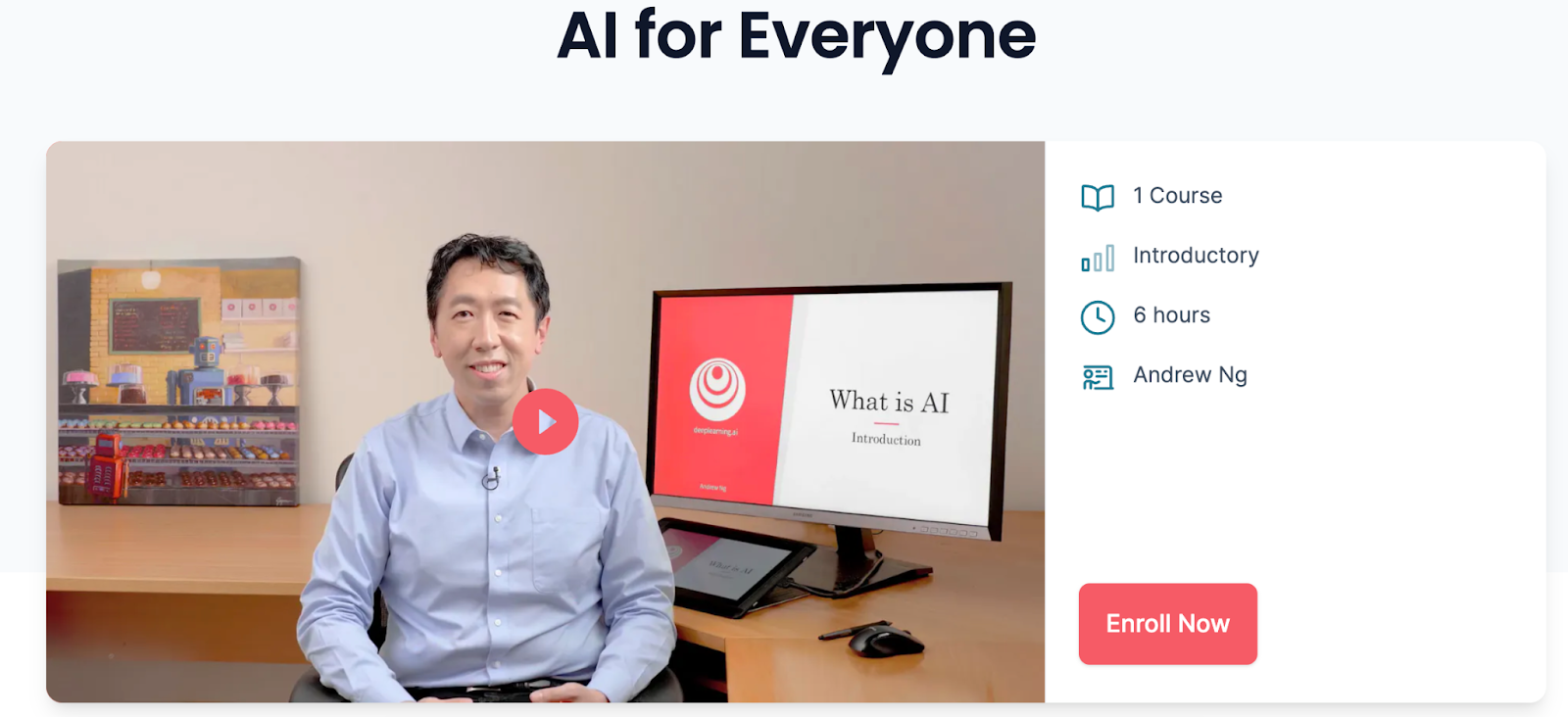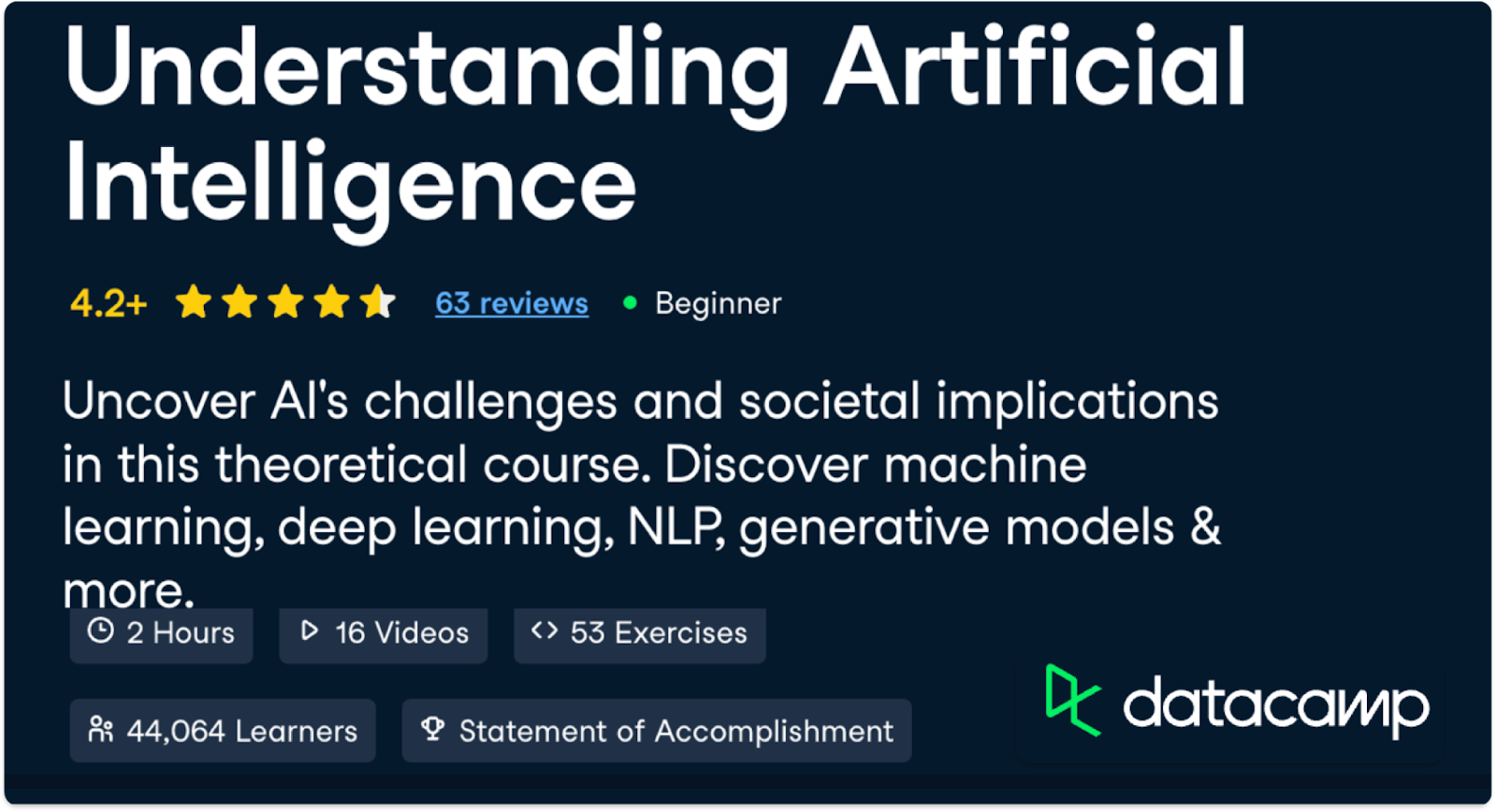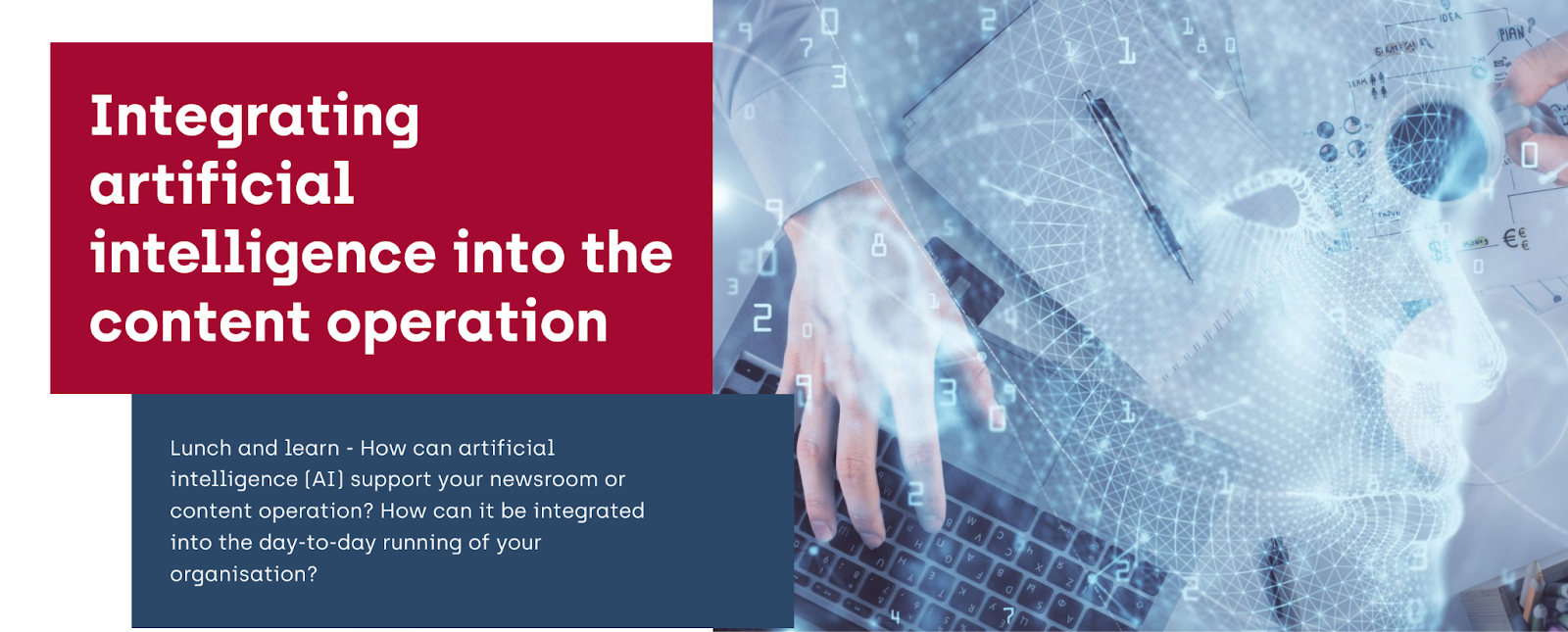In a three-part dedicated series, we covered AI Training courses and resources for Content Creators, Ad Ops Professionals, and Sales and Chief Revenue Officers. Professionals in these areas will soon (if not already) witness the impact of AI tools and technologies.
Every field within the online media industry is bound to be transformed.
For long-term success, publishers will need more than just job-specific AI training. They need an AI strategy that covers 100% of the workforce and equips them with the skills and knowledge needed to understand the evolving AI landscape.
This blog takes a holistic view of AI training, highlighting the key areas publishers must focus on to ensure all employees are adept at AI skills.
Course Name
Creator
What you'll learn
Duration
Price
AI Fundamentals
AI for Everyone
Applications of AI, what it can and cannot do, how to navigate the change
6 hours
$49
Understanding Artificial Intelligence
AI's challenges and societal implications, basics of machine learning, deep learning, NLP, generative models
2 hours
$25
Ethics of AI
AI Ethics
~2 hours
Free
Generative AI Learning Path by Google
Introduction and overview of LLMs and responsible AI principles
8 hours
Free
AI in Practice
Microsoft Azure AI Fundamentals
Common AI workloads and services to support them
Working with GPT-4, GPT-3, and DALL-E
8 hours
Free
Understanding Machine Learning
A non-technical introduction to machine learning
Includes real-world examples of ML applications
2 hours
$25
Generative AI Fundamentals Specialization (IBM)
Fundamental concepts, models, tools, and applications of generative AI
20 hours
7-day free trial
Generative AI Learning Plan for Decision Makers
Using generative AI in business to make technical decisions
4 hours
Free
AI Expertise: Building and scaling AI technologies in the business
Building AI-powered chatbots without programming
Create chatbots without code
12 hrs
7-day free trial
Integrating AI into content operations
National Council for the Training of Journalists
How AI can support newsrooms and content operations
1.5 hours
£89
Prompt Engineering for LLMs
Latest prompting techniques
4 days
$800
Generative AI - From Big Picture to Idea to Implementation
Application and tech behind GenAI
6 hours
$15
AI for Leaders: Creating and implementing strategies for AI in business
Leading Business Growth with AI and ML
Building blocks to develop transformational AI and ML capabilities
6 months
$9,000
Business of AI
When and how AI can deliver real business value for your business
10 weeks
£2,195
Machine Learning in Business
A foundational understanding of the advantages, limitations, and scope of ML from a management perspective
6 weeks
$3,500
Transform your business with Microsoft AI
Knowledge and resources to adopt AI in their organizations
3 hours
free
The need for an AI Learning Strategy
Every sustainable Generative AI (gen AI) implementation must begin with a holistic strategy that puts people at the center. It must support them through upskilling and reskilling to harness the power of these rapidly emerging technologies.
Driven by the collective enthusiasm for tools like ChatGPT and Dall-E, a lot has changed in the last few years. More recently, Sora, OpenAI’s Generative Video AI mode, shocked the world with its high-fidelity 1-minute videos, which industry experts believed was at least a few years away.
Millions of us now use AI applications, which, under the hood, are powered by technologies such as machine learning, deep learning, neural networks, and natural language processing. Their use cases range from generating text, image, visualization, audio, and video to providing big-data-based insights for content personalization and marketing.
According to Brainy Insights, revenue generated from Generative AI services is estimated to touch $188.6 billion by 2032, up from $8.65 billion in 2022 (a CAGR of 36.1%). PwC believes AI’s potential contribution to the global economy would be worth $15.7 trillion—nearly as much as China's GDP today!
89% of publishers use AI, and 91% believe it will impact their businesses in the next few years.
While publishers are not expected to become data scientists or programmers, to take advantage of AI's productivity gains, they must consider a broad range of skills required for its successful deployment across the enterprise.
Use cases can vary from deploying simple chatbots through prompt engineering to using complex algorithms that require knowledge of data science concepts.
Professionals from every industry are rapidly acquiring these skills. According to Reuters, Coursera recorded an AI course signup every minute in 2023.
While role-specific AI training is the first step, an effective AI training strategy should ensure that all employees, from entry-level to leadership, gain a comprehensive understanding of AI and its applications.
What publishers and employees must look for in AI training?
Training is not just about “checking the AI box.” Publishers must examine their business needs and skill gaps to improve their value proposition. This means putting employees in the lead, focusing on AI literacy, and developing fundamental skills that improve efficiency.
A good artificial intelligence course must enable employees to:
- Grasp what is happening around AI and how it matters
- Provide hands-on exposure to tools relevant to their work needs
- Cover tools and skills that enable them to do their job faster and more efficiently
- Provide access to career paths by expanding on skills they already possess
- Provide strategic awareness of how AI tools can make businesses more competitive
Different employee groups will have different AI needs. The graphic below shows the differing needs of employee populations:
Source: Guild Education, Inc.
Numerous good AI learning courses are available today, both free and paid, which can be bundled across four core learning areas:
AI Fundamentals: AI literacy, ethics, implications
These courses suit frontline learners, early to mid-career professionals, and executives. The following are some of the top courses in this category:
1. AI for Everyone (DeepLearning.AI)
DeepLearning.AI is an education technology company that aims to help organizations build an AI-powered future through education, hands-on training, and a collaborative community.
The company was founded by Dr. Andrew Ng, a globally recognized leader in AI who is also the Founder & CEO of Landing AI, a general partner at AI Fund, chairman and co-founder of Coursera, and an adjunct professor at Stanford University’s computer science department.

AI for Everyone is DeepLearning’s non-technical course designed to help understand AI technologies and spot opportunities to apply AI to problems. It includes examples of what today’s AI can and cannot do and how AI impacts society. It also touches on how to navigate this technological change.
The course is divided into four modules with a total duration of 6 hours and can be completed at your own pace. It has over 40,000 reviews (4.8/5) on Coursera.
Source: DeepLearning.AI
The course costs $49 for 180 days of certificate eligibility.
2. Understanding Artificial Intelligence (DataCamp)
DataCamp is a well-known platform for online data science education and offers a variety of courses on AI, ChatGPT, and machine learning techniques. The platform’s hands-on learning approach has helped over 14 million learners upskill.
Their gamified approach requires you to earn badges and unlock achievements as you progress through courses, making it fun to keep yourself motivated and engaged while you learn.

Understanding Artificial Intelligence is a two-hour theoretical course spread over 16 Videos and 53 Exercises. It seeks to uncover AI's challenges and societal implications. You can learn about the basics of machine learning, deep learning, NLP, Generative models & more.
The course is free to take and covers four broad areas:
- What is Artificial Intelligence (AI),
- Tasks AI can solve,
- Harnessing AI in Organizations and
- The human side of AI
Completing the course will earn you 3500 XP points and a Statement of Accomplishment. A non-paying user can access the first chapter of each course on DataCamp for free, while a subscription will cost $25 monthly.
Check other courses on DataCamp here.
3. Ethics of AI (University of Helsinki)
The Ethics of AI is a free online course by the University of Helsinki.

It is particularly relevant to publishers as it touches upon the ethical aspects and questions related to contemporary AI, such as:
- What is AI ethics
- What do the principles of beneficence (do good) and non-maleficence (do no harm) mean for AI, and how do they relate to the concept of the “common good?
- What does accountability mean, and how does it apply to AI ethics? What do moral agency and responsibility mean, and what is the difficulty of assigning blame?
- Why is transparency in AI important? What major issues are affected by transparency, and what are some risks associated with transparency in AI systems?
- What are human rights, and how do they tie into the current ethical guidelines and principles of AI? What does the right to privacy, security, and inclusion mean in the context of AI?
- What does fairness mean in relation to AI? How does discrimination manifest through AI, and what can we do to make these systems less biased?
- What are some of the challenges for AI ethics? What role do AI guidelines play in shaping the discussion? How might things develop in the future?
4. Generative AI Learning Path by Google
Google’s Generative AI Learning path is a collection of short introductory courses that provide an overview of the fundamentals of LLMs and responsible AI principles.

This includes:
- Introduction to Generative AI (45 minutes): an introductory-level microlearning course that explains what Generative AI is, how it is used, and how it differs from traditional machine-learning methods. It also covers information on Google tools to help develop Generative AI apps.
- Introduction to Large Language Models (30 minutes): a micro-learning course that explores large language models (LLM), their use cases, and how prompt tuning can enhance LLM performance.
- Introduction to Responsible AI (30 minutes): an introductory-level microlearning course that explains responsible AI and why it's important. It also introduces Google's seven AI principles.
- Applying AI Principles with Google Cloud (1 hour 30 minutes): focuses on operationalizing responsible AI in organizations. It teaches how Google Cloud does this today, together with best practices and lessons learned, to serve as a framework for building your own responsible AI approach.
All of the above courses are free and come with a completion badge.
2. AI in Practice: Understanding and using AI tools
These courses suit frontline learners, early to mid-career non-developers and tech and non-tech executives.
1. Microsoft Azure AI Fundamentals
Microsoft’s Azure AI Fundamentals introduces fundamental concepts of AI and services on the Microsoft Azure platform that can be used to create AI solutions. The course is designed to help participants become aware of common AI workloads and identify Azure services to support them.

The free course offers a blended learning experience that combines instructor-led training with online materials on the Microsoft Learn platform. The audience profile includes anyone interested in learning about the types of solutions AI makes possible.
While the course requires no experience with Microsoft Azure, a basic familiarity with computer technology and the Internet is expected. A basic understanding of mathematics, such as the ability to interpret charts, is also expected.
The course includes hands-on activities that involve working with data and running code, so it helps to gain knowledge of fundamental programming principles. Microsoft’s Azure also provides access to advanced OpenAI models such as GPT-4, GPT-3, and DALL-E.
2. Understanding Machine Learning (Datacamp)
This course provides a non-technical introduction to machine learning concepts. It begins by defining machine learning in relation to data science and artificial intelligence. It also delves into the machine learning workflow for building models, the different types of machine learning models, and methods for evaluating and improving these models.

The course concludes with an introduction to deep learning, including its applications in computer vision and natural language processing.
This course includes many real-world examples of machine learning for publishers, such as building recommendation systems, content optimization, audience segmentation, predictive analytics, automated content linking, and sentiment analysis.
Access to the course is part of the $25 monthly Datacamp subscription discussed earlier.
3. Generative AI Fundamentals Specialization (IBM)
This specialization course by IBM provides a comprehensive understanding of the fundamental concepts, models, tools, and applications of generative AI to enable you to leverage the potential of Gen AI in your workflows.
The course consists of five short, self-paced courses, each requiring 3–5 hours to complete. It covers prompt engineering techniques for writing effective prompts to produce desired outcomes using generative AI tools.

It also includes hands-on labs and projects suitable for everyone and can be completed using a web browser. These labs provide an opportunity to explore Generative AI use cases through popular tools such as IBM watsonx.ai, OpenAI ChatGPT, Stable Diffusion, and Hugging Face.
This specialization course does not require prior technical knowledge or a background in AI. Access beyond the 7-day free trial requires a Coursera subscription.
4. Generative AI Learning Plan for Decision Makers (Amazon)
This collection of three modules by Amazon is tailored for audiences who intend to use generative AI in business to make technical decisions.

It consists of a three-part series that includes:
-
Introduction to Generative AI—introduces Gen AI, use cases, risks, and benefits. It uses a content generation example to teach how it can be applied to business use cases.
-
Planning a Generative AI Project—focuses on the technical foundations and key terminology related to Gen AI and explores the steps involved in planning one. It also evaluates the risks and benefits of using Gen AI.
-
Building a Generative AI-Ready Organization—describes the key considerations for building a generative AI-ready organization. It touches upon the tools and knowledge needed to upskill employees and infuse generative AI thinking at the workplace.
3. AI Expertise: Building and scaling AI technologies in the business environment
While these courses are suited to mid-career non-developers, some of them do require a background in coding. These courses are relevant for engineering and tech staff.
1. Building AI-powered chatbots without programming (IBM)
This course teaches how to create chatbots without writing any code. It leverages IBM Watson's Natural Language Processing capabilities to plan, implement, test, and deploy chatbots that delight users.

You will learn how to create chatbots with Watson Assistant and how to deploy them on your website through a handy WordPress plugin.
The training module covers an introduction to chatbots, working with intents, entities, dialogues, deployment, context variables & slots, and digressions (such as handling unexpected questions).
The course is spread over 12 hours (approximately) and can be completed at your own pace. The course is free to audit under a 7-day free trial and requires a Coursera subscription beyond that period.
2. NCTJ - Integrating AI into content operations
This course by the UK’s National Council for the Training of Journalists introduces how AI can support newsrooms and content operations. It covers the process of integrating AI into an organization's day-to-day operations.

The course is suitable for small-to-medium-sized and large-scale publishers. Priced at £89, it is hosted via Zoom and lasts around 1.5 hours.
3. Prompt Engineering for LLMs (DIAR.AI)
We discussed the importance of prompt engineering previously.
Prompt Engineering for LLMs is a hands-on course by DIAR.AI (Democratizing Artificial Intelligence Research, Education, and Technologies) that covers the latest prompt engineering techniques/tools, use cases, exercises, and projects to learn how to effectively work and build with large language models (LLMs).

It includes the latest prompting techniques (e.g., fe-shot, chain-of-thought, RAG, prompt chaining) that can be applied to a variety of complex use cases such as building personalized chatbots, LLM-powered agents, prompt injection detectors, LLM-powered evaluators, and much more.
Because this course requires knowledge of programming languages like Python (and supporting libraries, such as Tensorflow), it is suited to publishing professionals inclined toward the technical side and have some knowledge of software engineering concepts. The course is priced at $800.
4. Generative AI - From Big Picture to Idea to Implementation (Udemy)
The course is informative yet accessible even to those without an AI and machine learning background.

It covers Generative AI from the application, tech, and ethical angles. It is available on Udemy and suited for a wide range of audiences, from entrepreneurs to tech enthusiasts to visionaries who want to help shape the future with Generative AI.
4. AI for Leaders: Creating and implementing strategies for AI in business.
1. AI and ML: Leading Business Growth (MIT)
This MIT program, designed in collaboration with Northwest Education, is suitable for high-performing business leaders, mid-to senior-level managers, consultants, and other business professionals.

It aims to provide a comprehensive understanding of the systemic aspects and practical application of AI and ML. The course takes a deep dive into six main building blocks to develop transformational AI and ML capabilities:
- Creating a strategic vision and roadmap
- Transforming data into information
- Identifying the right computing and infrastructure frameworks
- Applying algorithms – turning information into knowledge
- Human-machine teaming – turning the knowledge into insights
- Successful deployment – achieving robustness, trustworthiness and addressing risks
It is a live virtual course spanning six months and has specific timelines for completion. The course fee is $9,000.
2. The Business of AI by London Business School
The program is designed for executives and mid-to-senior-level professionals with eight or more years of experience in management and leadership. It focuses on connecting AI and ML technology to business value and results.

The course is ideal for C-suite executives and senior leaders who want to expand their understanding of technology trends and AI's different applications.
It also suits mid- to senior-level functional managers seeking to learn how AI can improve performance within their functional area and have meaningful conversations with technology experts. Product and technology managers looking to create AI-based products can also enroll in this course.
It is a self-paced, flexible online learning program designed with up to 50 hours of pre-recorded faculty-led lectures and comes with the benefit of a learning manager to boost your development.
The course fee is £1,900 and requires an application to be submitted in advance.
3. Machine Learning in Business (MIT Sloan School of Management)
This is a self-paced 6-week course with an estimated 6-8 hours of study time per week.

It aims to demystify machine learning for the business professional – offering you a firm, foundational understanding of the advantages, limitations, and scope of machine learning from a management perspective.
Learning is imparted through various formats, including interactive videos, practice quizzes, presentations, assignments, and discussion forums. It touches upon successfully integrating AI technologies into an organization with a strategic action plan.
The course is priced at $3500 and needs to be enrolled in advance.
4. Transform your business with Microsoft AI
Microsoft provides a free curated learning path for business leaders to help them acquire the knowledge and resources to adopt AI in their organizations.

This is a 2 hr 51 min course spread over 4 modules that include:
- Leverage AI tools and resources for your business
- How to create business value from AI
- Embracing responsible AI practices
- Scaling AI in organizations
How AI can transform publishers' workflow?
Possibilities with Generative AI are endless, and the window of opportunity is now.
For publishers, developing AI skills and capabilities internally is a smart move. However, finding the right technology partner is equally important as AI technologies will continue to evolve at breakneck speeds.
For example, as video content dominates the internet, Gen AI Video tools offer a promising path to switch to video at scale. However, training native models to capture unique brand voices can be difficult to achieve internally.
Aeon makes this flawless and simple. Publishers can:
- Automate text and script for video editing
- Introduce real emotion with ultra-realistic text-to-speech in videos
- Choose the right video format
- Dynamically crop images based on the narrative and visual requirements.
- Elevate videos with AI-powered music integration
- Automatically caption videos to match the publisher’s brand's style
If you are a publisher, read why switching to video is the right strategy to futureproof your business and how Aeon can help.
